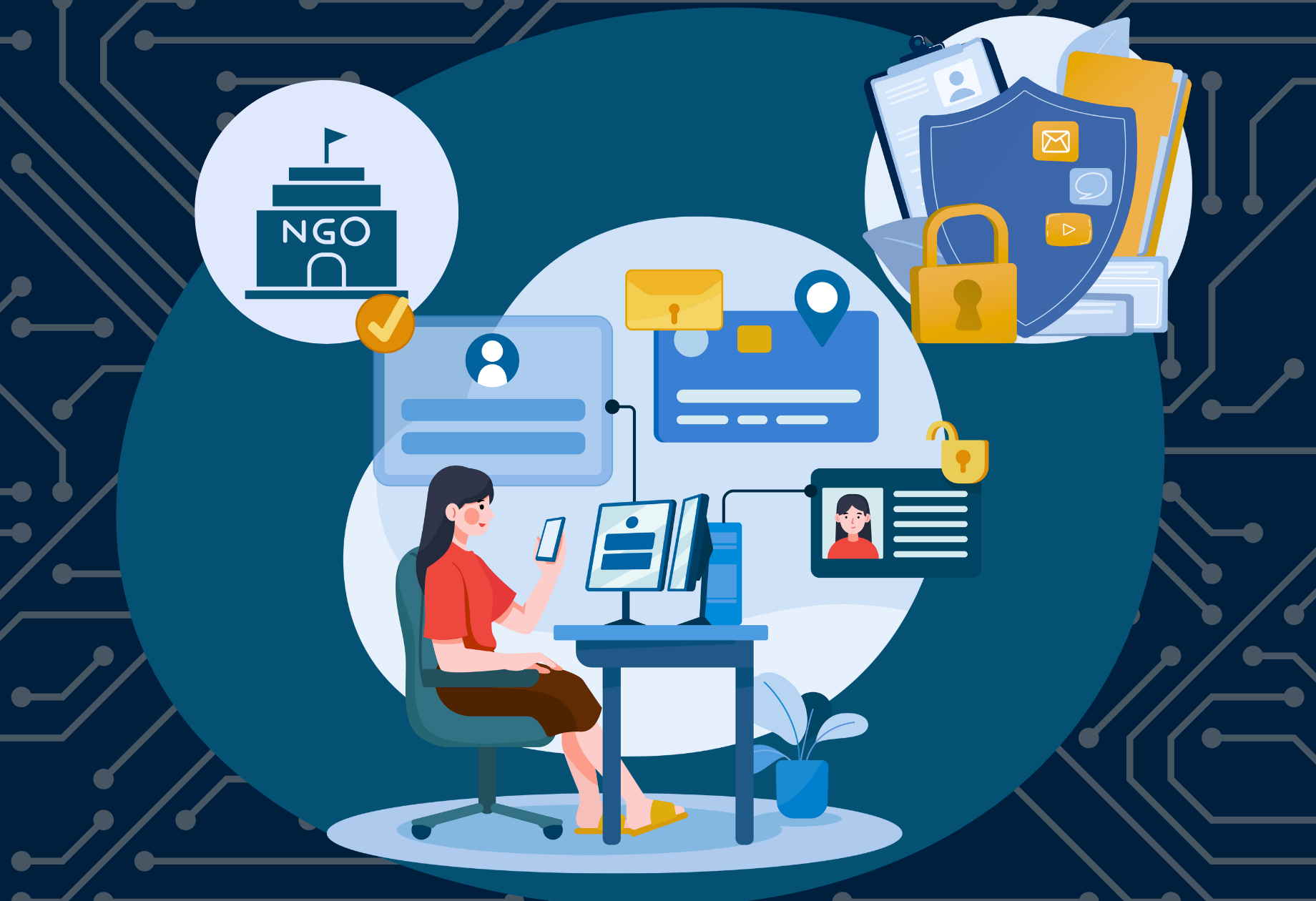Cybersecurity is essential for nonprofit organizations, which often handle sensitive donor data, financial records, and operational information. Without proper safeguards, nonprofits risk data breaches, ransomware attacks, and reputational damage. This guide focuses on actionable strategies for data protection for nonprofits, covering physical and digital security measures to help organizations mitigate risks effectively.
Understanding the Risks
Nonprofits face unique cybersecurity challenges due to their reliance on donor trust and limited resources. Common risks include:
- Phishing Attacks: Cybercriminals often target nonprofits with phishing emails designed to steal login credentials or financial information.
- Data Breaches: Exposing sensitive donor or beneficiary data can lead to identity theft and loss of trust.
- Ransomware Threats: Ransomware encrypts critical files, disrupting operations until a ransom is paid.
By understanding these risks, nonprofits can prioritize their cybersecurity efforts and protect their valuable data.
Physical Security Measures
Physical security plays a vital role in safeguarding IT infrastructure and sensitive data:
- Access Control: Limit physical access to servers and workstations by implementing keycard systems or biometric authentication. Ensure that only authorized personnel can access critical areas.
- Secure Workspaces: Lock filing cabinets and safes containing sensitive documents and restrict access to areas where confidential discussions occur.
- Device Management: Ensure employees’ laptops, tablets, and mobile devices are tracked and secured with encryption software.
These measures minimize the risk of unauthorized access to physical assets and sensitive information.
Digital Security Strategies
Digital security is equally important for protecting nonprofit operations:
1. Data Governance
Establish clear policies for collecting, storing, and accessing data. Regularly audit your systems to ensure compliance with best practices. Encrypt sensitive files to protect them from unauthorized access during transmission or storage.
2. Technical Defenses
Implement firewalls and antivirus software to prevent malware attacks. Regularly update systems and apply patches to close vulnerabilities that hackers might exploit.
3. Backup Systems
Schedule automated backups of critical files to secure locations or cloud services. Test recovery processes regularly to ensure data can be restored quickly in case of an incident.
4. Employee Training
Educate staff on recognizing phishing attempts, using strong passwords, and reporting suspicious activity immediately. Conduct regular training sessions tailored to your organization’s specific risks.
Compliance with Data Privacy Laws
Nonprofits must comply with regulations like GDPR (General Data Protection Regulation) or CCPA (California Consumer Privacy Act) when handling donor data:
- GDPR Compliance: Obtain explicit consent before collecting personal data from donors in the EU. Provide individuals with the right to access or delete their information upon request.
- CCPA Compliance: Notify California residents about how their data is collected, stored, and used while offering opt-out options for data sharing.
By adhering to these laws, nonprofits build trust with donors while avoiding fines or legal issues.
Case Studies: Lessons Learned from Cyber Incidents
United Way of Tarrant County Cyberattack
In 2019, United Way of Tarrant County experienced a ransomware attack that disrupted operations for weeks. Key lessons included:
- Regular Backups: Ensure backups are accessible during emergencies.
- Incident Response Plans: Develop clear protocols for handling cyber incidents.
- Staff Awareness: Reinforce the importance of vigilance against phishing attempts.
This case underscores the importance of proactive cybersecurity measures tailored to nonprofit needs.
The Role of Financial Management in Cybersecurity
Effective cybersecurity requires proper financial planning and resource allocation. Nonprofits should:
- Budget for Security: Allocate specific funds for cybersecurity tools, training, and potential consultants.
- Risk Assessment: Conduct financial impact analyses to understand the potential costs of a data breach.
- Insurance Considerations: Evaluate cyber insurance options to mitigate financial losses from security incidents.
Recent data shows nonprofits that allocate at least 5% of their IT budget to security measures experience significantly fewer breaches. This investment typically pays for itself by preventing costly incidents and maintaining donor trust.
Integrating Security with Donor Management
Your donor management systems contain some of your most sensitive data. To enhance protection:
- Secure CRM Systems: Implement role-based access controls for donor databases.
- Payment Processing: Use PCI-compliant payment processors for all donations.
- Data Minimization: Only collect and retain essential donor information.
- Retention Policies: Establish clear timelines for how long different types of donor data should be kept.
Remember that donors entrust you with their personal and financial information. Protecting this data is not just a technical requirement but an ethical obligation demonstrating your commitment to your supporters.
Creating a Culture of Security
Technical solutions alone cannot protect your nonprofit. Building a security-conscious culture requires:
- Leadership Commitment: Security initiatives must be visibly supported by executive leadership.
- Regular Communication: Share security updates and reminders through multiple channels.
- Recognition Programs: Acknowledge staff members who identify and report potential security issues.
- Inclusive Planning: Involve representatives from different departments in security planning.
When security becomes everyone’s responsibility rather than just “an IT issue,” your nonprofit develops a much stronger defense against potential threats.
Additional Considerations
Budgeting for Cybersecurity
Allocate resources for essential tools like antivirus software, firewalls, and employee training programs. If internal expertise is limited, consider hiring IT consultants or cybersecurity professionals.
Third-Party Risk Management
Evaluate the security practices of vendors providing services such as cloud storage or payment processing. Ensure contracts include clauses requiring adherence to strict cybersecurity standards.
Cyber Insurance
Invest in cyber insurance policies covering financial losses from cyberattacks or data breaches.
Expert Financial Support for Your Cybersecurity Initiatives
Implementing robust cybersecurity measures requires not only technical expertise but also sound financial management. At Temple Management Consulting, we understand the unique challenges nonprofits face in balancing mission-critical activities with cybersecurity needs.
Our team of certified public accountants specializes in nonprofit financial management and can help your organization:
- Develop Cybersecurity Budgets: Create realistic financial plans that allocate appropriate resources to security initiatives without compromising your core mission.
- Assess Financial Risks: Quantify the potential financial impact of data breaches or security incidents on your organization.
- Optimize Technology Investments: Ensure your technology spending delivers maximum security benefits while maintaining fiscal responsibility.
- Navigate Compliance Requirements: Understand the financial implications of regulatory compliance and implement cost-effective solutions.
Don’t let financial constraints compromise your nonprofit’s security posture. Contact Temple Management Consulting at (770) 892-2087 or email [email protected] to schedule a consultation. Our team will help you develop a financially sustainable approach to cybersecurity that protects your organization’s data, reputation, and mission.
Conclusion
Nonprofits must prioritize cybersecurity as part of their operational strategy to protect sensitive donor data and maintain trust within their communities. By implementing physical security protocols, digital defenses, compliance measures, and staff training programs, organizations can effectively safeguard their mission-critical operations against cyber threats.
Ready to strengthen your nonprofit’s financial management and cybersecurity posture? Temple Management Consulting provides comprehensive virtual accounting and financial management services tailored specifically for nonprofit organizations. Visit www.templemanagement.cpa or call (770) 892-2087 to learn how we can help you implement financially sound security practices while focusing on your mission.
With these strategies in place, nonprofits can focus on achieving their goals without compromising the integrity of their data or reputation.



